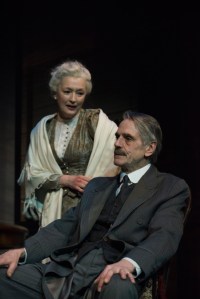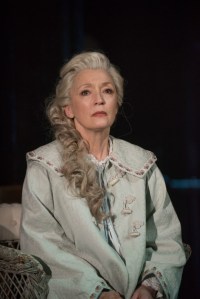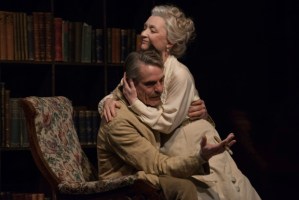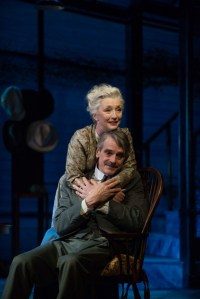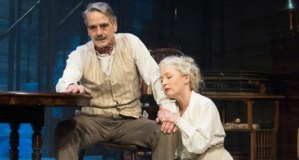Review: Long Day's Journey Into Night (Wyndham's Theatre)
The Bristol Old Vic production of Eugene O’Neill’s Pulitzer Prize-winning piece transfers into the West End
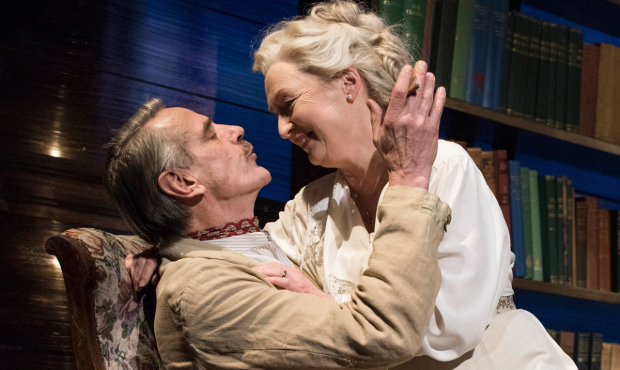
© Hugo Glendinning
I was in tears at the end of this astonishing production of Eugene O’Neill‘s semi-autobiographical masterpiece. That’s partly because it is such a great play, with perhaps the saddest closing line ever written.
But it is also because director Richard Eyre has taken a classic, written in 1941, and treated it as a new play, stripping away all previous conceptions. Thanks to a quartet of magnificent performances led by Lesley Manville and Jeremy Irons, it finds a freshness and directness that touches to the heart.
What you normally see, are a lot of squabbling misfits based closely on O’Neill’s own family. The father James Tyrone is a drunken has-been actor, harping on past glory; the mother Mary is cruelly addicted to morphine thanks to her husband’s meanness, his refusal to pay for a good doctor after the birth of her younger son. That son Edmund is a self-pitying consumptive, who dreams of being a writer; his brother Jamie is an even more drunken failure than his father.
What you get here is something subtly different. Eyre shows how each male member of the family has been profoundly affected and damaged by Mary’s addiction. It becomes a play about love, about a family who care for each other, trying to deal with their own fallibilities while coping with the addict in their midst.
Rob Howell’s glass set wonderfully creates a real sense of the Tyrone’s tatty summer home and yet also suggests the way that the sea and the fog that surround them as light turns to darkness (Peter Mumford provides exactly the right levels of illumination) is a metaphysical as well as a physical state.
Just as he did in his production of Ibsen’s Ghosts, which also starred Manville, Eyre makes the dialogue whip along. It has the thrust and speed of real family life. But he gives weight to words and meanings. This is a play in which everyone is haunted by the past, by the path not taken or the actions taken but regretted. Yet it also here, becomes a play about a longing to belong. The word 'home' rings through the action like a bell, sounded by Mary as she counts the cost of life as an actor’s wife on the road, by James as he remembers his own mother’s attempts to avoid the poor house.
It’s like watching molten literary criticism, and that attention to meaning pays other dividends too. The long scene between Edmund and his father, so often a battle of competing wills, becomes thoughtful and contemplative. James longs for his son’s approval and how Edmund admires his father. When Jamie angrily describes him as "Papa’s pet", you actually know it to be true. It’s even possible that he will overcome his ingrained meanness and keep his promise to pay for a better sanitorium.
It’s beautifully choreographed too with the way the characters stand and sit speaking as loudly as their words. Matthew Beard’s wonderfully raw Edmund is all hands and gangling feet, his awkwardness expressing itself through the way he folds himself into a chair. When he picks up a book in the middle of an argument you understand how literature has become a refuge from life; when he and Jamie fight, they do so on feet so unsteady that they can barely stand, battling like brothers so that Jamie both kisses his brother’s head lightly and bashes him on the back at the close.
Both Beard and Rory Keenan who plays Jamie are new to the production since it opened at the Bristol Old Vic nearly two years ago and both are assets; Keenan’s agony is almost unbearable, all the more so because he keeps pretending he doesn’t feel it, dancing a little dance of defiance.
Irons too conveys real physical love for his stage sons. His James is urbane and quiet, an image of repression and self-doubt. You feel his disappointment with his entire life. There’s a real charge between him and Manville; when he realises she is once again "a dope fiend", he clenches his fists and looms over her in a pose of angry resignation. There’s an extraordinary moment when she perches on his knee and he rocks her like a child.
His stillness is contrasted with Manville’s busyness. From the first moment we see her, she is trying to run upstairs, to find relief in oblivion. As the drugs take hold, she is both tragic and unbearable; you feel the anger rising in her family as they have to endure her endless reminiscing and volubility. There is no one as good as Manville at suggesting abiding sorrow. Even when she tries to be bright, there is disgust and self-loathing in her eyes.
This is a performance of detailed genius and for all the excellence surrounding her, she makes it her play. But that’s Eyre’s decision too, to turn a classic on its head and shine new light on it. By the close, when Manville sits like a wraith amongst the men who are forced almost against their will to watch her drift away from them, it has found an emotional truth that is utterly devastating.
Long Day's Journey Into Night runs at Wyndham's Theatre until 8 April.


